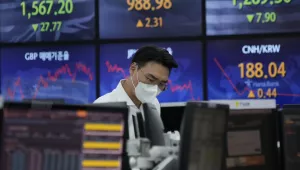We unexpectedly find ourselves in uncharted territory, in so many ways. The United States has never before had a president with no political or military experience. And Donald Trump is especially unpredictable: he has so often said things that conflict with other things he has said. So it is hard to know what he will do.
But a possible precedent for what the Trump presidency may look like sits in plain sight: the George W. Bush presidency. To be fair, the Bush family clearly did not support Trump’s campaign. But a number of parallels suggest themselves:
- The candidate won the presidency while losing the popular vote.
- The new president nonetheless believes he has a mandate for sweeping change.
- The direction of the change and the results it produces will not necessarily be what those who “voted for change” will like.
- Observers are assuming that Mr. Trump will oppose the Fed’s easy monetary policy, because he attacked it during the campaign; but I predict that when he gets into office he will turn dovish, opposing interest rate increases.
- Of his economic policy proposals, the ones that are most likely to be put into law are big tax cuts for the rich and increased spending on the military and on some other items. The result will probably be the same as when Bush enacted similar fiscal policies: a worsening of the income distribution and huge budget deficits.
- A Trump return to the post-1980 trend of increasing income inequality would follow a temporary reversal of that trend that occurred toward the end of the Obama Administration (by such measures as median family income, real wages, and the poverty rate). This is the same thing that happened in the transition from the Clinton Administration to Bush.
- The new president won’t be able to deliver his 4% GDP growth rate.
- He is unlikely to be able to increase the role of exports in the economy.
- He certainly won’t be able to make good on his promise to bring back the manufacturing jobs that have disappeared since the 1950s.
- Most worrisome of all are possible foreign policy disasters. We should fear miscalculations leading to tragedies (analogous to Bush mistakes regarding the 9/11/2001 terrorist attack, the failure to apprehend Osama bin Laden, and the subsequent invasion of Iraq). A loss of US global leadership is likely, especially loss of “soft power,” in the sense that those who live in other countries have in the past looked to the United States as a leader of the international order and as a model domestically of what they hope their own countries could be like. Finally, Trump’s cluelessness on the international stage will likely embolden some traditional adversaries, such as Russia, Syria, and North Korea.
If I had to guess, we are not likely to see some of the more outrageous proposals from Mr. Trump’s campaign enacted.
- He will not build a big beautiful new wall along the length of the border, and Mexico certainly wouldn’t pay for it if he did.
- We won’t see a ban on Muslim immigrants, which would violate longstanding bedrock American principles.
- We won’t see deportation of eleven million undocumented immigrants. But he will likely end Obama’s Deferred Action for Childhood Arrivals program, which granted temporary work permits to many “dreamers.”
- My best guess is that he won’t in fact tear up NAFTA or raise tariffs as widely as he has said. I hope this is not just wishful thinking.
- Similarly, I don’t think he will tear up NATO or our other alliances, as he seemed at times during the campaign to suggest. Nor the Geneva Convention. Even Mr. Trump has to confront at some point how drastic would be the consequences or this sort of destruction of the global order.
But it is likely that he and the Republican Congress will, as he promised, take some steps to roll back the biggest accomplishments of the first part of the Obama Administration. Number one is a rolling back of Obamacare (going beyond the damage that Republicans have done since the beginning by chipping away at the legislation). It will be interesting to see people’s political reaction when they start losing their health insurance.
Number two is a rolling back of Dodd-Frank financial regulation, which was enacted after the financial crisis of 2007-09. The Republicans will give banks and other financial institutions a freer hand.
They will also roll back competition policy and environmental regulation, especially regarding emissions of greenhouse gases.
And of course they will seek to appoint conservative justices to the Supreme Court. Logically, the Democrats could try to block such appointments in the same way that the Republicans in Congress refused to hold hearings on Barack Obama’s nominee for the Court (and otherwise blocked almost everything that the President tried to do). But they probably won’t.
We are about to see what life is like when the Republicans hold all branches of government. It will be interesting to see if working Americans will blame them for setbacks.
Frankel, Jeffrey. “What Will the Trump Presidency Look Like?.” November 12, 2016



